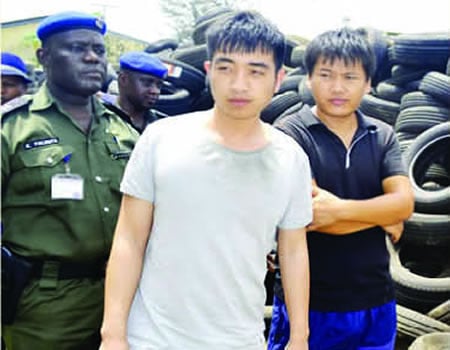There is a joke about a Nigerian lady married to a Chinese guy against her relations’ wish. The couple’s first child died at infancy and her relations were expectedly heartbroken and at the same time suspecting a foul play. Her older sister cried a bucket at the couple’s home and kept shouting “I know, I know”. Other relations quickly gathered around her, in the assumption that she had found the truth. When pressed to divulge what she knew, she said “I know. Chinese products don’t last”.
Early March, the Director-General of the Standard Organisation of Nigeria (SON), Mr Osita Aboloma, called for increased inter-agency collaboration among the parastatal agencies manning Nigeria’s border points as a way of checkmating the influx of sub-standard products in the country. Indeed, the Nigerian Customs Service, SON, National Agency for Food and Drug Administration and Control (NAFDAC) as well as other federal regulatory agencies seem to be at work.
They can beat their chest any day to confirm that their mandates with regard to stopping substandard products from flooding Nigerian markets are being fulfilled. One of such positive efforts yielded results when recently, SON arrested some Chinese nationals with fake tyres worth N5 billion.
Daily, Nigeria keep counting losses, whereas the Chinese authorities remain reluctant to admit that majority of substandard goods in Lagos were imported from the Asian giant.
The Chinese way
A few years ago, a former SON Director-General, Joseph Odumodu, at a forum organised by the Senate Committee on Trade and Investment, said: “Statistics from a survey we conducted in 2011 showed that an estimated annual loss to sub-standard products may be in excess of N1 trillion.” Similarly, the Organised Private Sector (OPS), in May 2016, said the Federal Government lost about N15 billion annually to fake and sub-standard products in the country, while other estimates concluded that the country lost about N50 billion annually to importation of fake and substandard products.
The variation in figures points to the fact that regulatory agencies are at work. But Saturday Tribune’s investigations reveal that more than 80 percent of products in Lagos markets today are sub-standard and majority of them were imported from China. In fact, there are disturbing stories to the effect that manufacturers produce original products for home use, which China hardly export, only to allegedly dump fake products from their overproduction in Nigeria and other African countries capitalising on weak border control.
This problem has persisted for so long because of the lack of political will by the Chinese authorities to curb the manufacturing of substandard and fake products for exports to developing countries like Nigeria as the failure of past efforts by Nigerian regulatory authorities to get the cooperation of their Chinese counterparts in tackling the menace has indicated.
More confusing is that importation of products into Nigeria requires the possession of Standard Organisation of Nigeria (SON’s) conformity assessment programme (SONCAP) certificate while locally made products are permissible with the agency’s mandatory conformity assessment programme (MANCAP). Still, Chinese nationals bring in sub-standard products and even rent shops in Lagos and, indeed, across Nigeria and sell them. For instance, SON, on 8 September, 2015, confiscated over 1,000 cartons of phones in Kano and arrested an alleged owner of the fake phone warehouse, Yi Fang Communication, located in Kano.
When the situation seemed to be getting beyond the agency, it held a meeting with the Chinese Standards Organisation, a body that regulates imports and exports of the Asian country, to discuss the problem and find ways of putting an end to it.
“In fact, they were very hostile to us because at the end of the day what we were asking for was not what they were saying. At a time they pretended that they no longer understood English language just to make sure that that discussion was terminated. But we made our point clear that we have the right to fight for the safety and performance of products that are brought to Nigeria,” Odumodu recalled of that encounter.
Inadequate enforcement
SON is the apex regulatory body saddled with the responsibility of enforcing standards and managing quality.
Speaking with Saturday Tribune, on Thursday, the coordinator of SON’s Lagos State Office III, Mrs Ngozi Ekwueme, said the influx of substandard goods into Lagos and the rest of the country could be checked with greater cooperation from residents.
She said all products must conform to the requirements set by SON. After they have conformed to the requirements, “we now give them the statistics so that they would now be able to sell in the Nigerian market.”
Most stakeholders are confused on whom to blame for this menace. According to them, if SON had performed its duties well, how then did more sub-standard products flood Lagos markets?
Ekwueme said the products are even certified to what SON call MANCAP, Mandatory Conformity Assessment programme.
“Every product must have that before selling in the Nigerian market. The same goes for imported goods. You saw how we tracked substandard tyres. SON monitors, even in the warehouse. If we track them in the warehouse, we check what they have brought into the country. Mostly you know that the Chinese are the ones importing. If we get into the warehouse, we track the goods; we still take them to our laboratory to analyse. We don’t just look at a product and say it is substandard.
“We work with stakeholders. We have an office that is Consumer Complaints Department, and then we advise consumers to always interact with us. If you see a warehouse, and they open and close, and you don’t know the kinds of goods that are there, you don’t know whether SON has checked them, we advise you to move and report at the nearest SON office. Such complaints are always treated with confidentiality. That was how we got the tipoff in the case of the substandard tyres.”
She said there are several quality marks on different products, and urged residents to always contact the agency wherever they are not sure of the quality of a particular product, or what the marks on the product represent
In May 2015, for instance, the police in Beijing, capital of China, raided a factory producing fake Apple iPhones following a complaint by the United States. During the raid, the police found six production lines hidden in the depths of an industrial zone on the northern outskirts of the Chinese capital. About 41,000 units of the iPhone valued at 120 million yuan ($19 million) were said to have been produced in the fake factory. The factory was disguised as a gadget maintenance shop since the commencement of their operation in January 2015. It was found that the owners of the factory bought used smartphone mainboards (motherboard) from overseas and fake parts bearing Apple logos from Shenzhen, a technology hub in southern China and then hired hundreds of workers to assemble and repackage the fake smartphones for export.
The Chinese authorities were alerted to the crime by the US authorities after some of the counterfeit phones found in the US were traced to the factory. China has also agreed to work with the US authorities to end the influx of fake and counterfeit products entering the US from China.
This conforms to the defence put up by Ambassador Zhong Jianhua, China’s special representative on African Affairs. In an earlier interview with Saturday Tribune, Jianhua said that the same way Nigeria has SON is the same way China has its own standard regulatory agency, yet people manipulate the system with the result that substandard products are still found in the market.
According to Wikipedia, “Despite the growing number of raids on hubs for traders of counterfeited goods and the rise in the number of lawsuits brought against companies that use counterfeited technology, codes, or logos, the level of government response does not quite match the degree to which counterfeiting is happening in China.”
Double standard
Perhaps to confirm that there are double standards by the Chinese authorities as earlier stated by Nigeria’s SON DG, that “what we were asking for was not what they were saying,” the China’s special representative on African Affairs turned and said “some people are angry because one thing you should never forget is that we the Chinese people actually broke some people’s monopolized market.” He said Europeans are angry because the Chinese have put a stop to what they enjoyed before.
His words: “Look at it on the other side. When you sold the oil for six pence per barrel, how much do you pay for imported suit? You pay five hundred dollars because the only supply is from Europe. How many barrels of oil do you have to export before you buy a suit in the past? Today, when you buy a Chinese-made suit, how much do you pay? You pay less than three dollars, which is the cheapest.
“Why do you complain about colonization from China? It is because some people have been made very angry in the market place. I think we are doing something good for the people who sell oil. In the old system, you would never have the opportunity for your own investment in infrastructure. But today, with this free market, the door is open. Over ninety per cent of infrastructure built in this continent in the last decade was built with your raw materials and your own money.”
Oshodi influx
Despite denials by China that its citizens export counterfeit and substandard products to Nigeria, a trader at Oshodi Lagos, Mr Chigozia Awah, claimed that it is generally held that products made in China have short life span and cannot be repaired when damaged.
“Again, all inferior products in the country are believed to have been made in China or Taiwan. When one says a product is China or Taiwan, the underlying meaning is that such product is either counterfeit or substandard. In fact, it has got to a point that when you ask secondary school children the opposite of original, they will answer China,” Awah observed.
China has a reputation of producing and exporting substandard products across the world, which include pharmaceuticals, auto spare parts, mobile phones, textile materials, vehicle spare parts, DVDs, electronics, electrical equipments, branded footwear, designer clothing and bags, toys, toothpastes and toothbrushes, cosmetics, building materials, office and household appliances and equipments, cosmetics, wine, food products and confectioneries. A significant percentage of these counterfeit products are targeted at the Nigerian market, thus making Nigeria one of the world’s largest markets for fake and substandard products. The counterfeit business is also huge in the technology sector, generating huge income for the perpetrators at the expense of the consumers, original equipment manufacturers (OEMs) and the national economy.
A public policy analyst, Mr Edward Kwusue, told Saturday Tribune that the recent Chinese push into Africa is driven by China’s need to find oil and industrial raw materials to feed its resource-guzzling, and world’s fastest growing, economy, as well as untapped export markets to address industrial overproduction.
“Though this comes with huge financial aids to Africa, it is equally important to regulate the standard of goods that goes into export market because, a product circle is complete when it reaches the consumer. This is important after several years of ‘Autarky’, in which China closed her economy to external trade for a rebirth. The Chinese government now has a new policy of ‘go out.’ But what is the general perception of end users of what goes out should occupy discuss in both government and private sector circles,” Kwusue said.
To some analysts, while it is easy to conclude that China is flooding Lagos Market with sub-standard products, when one sees ‘Made in China’ goods in every Lagos market place and Chinese construction crews on seemingly every construction site, it is easy to forget that there are benefits already derived from there.
China is Africa’s largest bilateral trading partner, recording over $200billion worth of trade. Many Sub Saharan Africa (SSA) economies would be at risk if China crashes and the flow of cash is curbed.
The twist
Major investors in Europe, Americas and even Asia now turn to China to produce goods which they could not produce in their respective countries. The best Nokia phones in the American and British markets are manufactured in China. If such quality phones are produced in Europe, the prices would have been too high, given the high cost of their production.
Some traders who spoke to Saturday Tribune were in agreement that just like American and British investors, Nigerians have also turned to China to produce. But while American and British investor-vendors have respect for model and quality specifications in accordance with the prescriptions in their respective countries, their Nigerian counterparts prefer to cut corners to make ungodly profits.
Worse still, the Chinese factories accept to produce whatever poor quality that is asked for by the Nigerian investor-vendors. The Nigerian investor goes to China with products for which they have no copyright for counterfeiting, without the Chinese factories asking questions or complying with the existing laws. This explains the poor quality or counterfeit products from China and the culpability of the country in the crime.
According to the traders, Nigerians do not have the moral justification to call the products of others substandard. Nigeria should produce for the Nigerian market. “We are, therefore, of the view that if the major industrial enabling factor – power or energy – is tackled to end the age-long wahala over fake products from China and India, it will be good for the country,” one of the traders said.
Need for urgent action
Many lives have been lost due to consumption of fake products, particularly medicines. Road accidents attributed to the use of substandard tyres have claimed many lives. Fake electrical products such as cables have also been connected with fire outbreaks that claim lives and properties. Some fake cosmetics have been found to contain lethal ingredients that cause bodily or organ damage.
Experts have urged the Nigerian government to rid the country of fake, substandard and counterfeit products from China for her economy to experience real growth. Government must also ensure that drastic actions are taken against the Chinese counterfeiters and their Nigerian collaborators to stem the tide.







